Immanuel of Rome for Digital Dante
Isabelle Levy, (2017)
- Immanuel’s Life and Works
- The Maḥbarot Immanuel
- Immanuel’s Vernacular Italian Poetry
- Concluding Thoughts
- Selected Bibliography
Though a minor figure among poets of Dante’s circle, Immanuel of Rome presents a unique case that enriches our understanding of Dante’s multicultural environs, a topic to which scholars have begun to devote significant attention (See Barolini, “Dante’s Sympathy for the Other”; see also Dante and Islam, ed. Ziolkowski). In addition to being the first poet to write a sonnet in a language other than Italian (in this case Hebrew), Immanuel is the only Jewish poet whose thirteenth- early-fourteenth-century Italian lyrics are extant, surviving in six manuscripts.
Immanuel’s Life and Works
We know frustratingly little about Immanuel’s life; much of the biographical information that has been accepted as fact originated in Immanuel’s fictional writings. He was born in Rome in 1261 and lived until roughly 1335, fourteen years after Dante’s death. He acted as head of correspondence for the Jewish community of Rome and might have held a more permanent high post in the Jewish community. He likely left Rome in 1321, perhaps in response to the 1321 papal edict to expel the Jews from Rome, though there is little evidence regarding the extent to which the Church enforced the edict. Scholars suppose that Immanuel moved among Perugia, Fabriano, Fermo, Camerino, Ancona, Gubbio, and Verona, having gleaned this itinerary from Immanuel’s fictional writings. Gubbio is a plausible location, given Immanuel’s tenzone with Bosone da Gubbio and because he is referred to as “Manuel Giudeo da Gobio” in the Vat. Barb. Lat. 3953, folio 128.
Immanuel is best known for his Maḥbarot Immanuel, a Hebrew-language collection of stories in rhymed prose and poetry often referred to as a maqāma (Ar. pl. maqāmāt; Hebraized pl. maqamot; Hebrew equivalent maḥberet, pl. maḥbarot), a prosimetric genre that first appeared in Arabic in the tenth century in the region known today as northeastern Iran. After gaining traction in Arabic literary circles as a scholarly and didactic genre, the maqama was adopted for use in Hebrew in Christian Spain during the first part of the twelfth century. Though it is highly unlikely that Immanuel knew Arabic, he was certainly familiar with the Hebrew maqama arriving from Spain, particularly with Judah al-Ḥarizi’s Ṭahkemoni, the Hebrew maqama that most clearly adheres to the form of the canonical Arabic maqama and to which Immanuel refers in his introduction to the Maḥbarot Immanuel.
Aside from the Maḥbarot Immanuel, Immanuel also wrote: a treatise in Hebrew on the symbolism of the Hebrew alphabet (not extant); a hermeneutic work in Hebrew entitled Even Boḥan (Examination of Stone); Hebrew commentaries on nearly the entire Bible; a philosophical epistle in Hebrew to philosopher, physician, and biblical exegete Hillel ben Samuel of Verona; and five poems in vernacular Italian (four sonnets and one poem that has been termed a frottola).
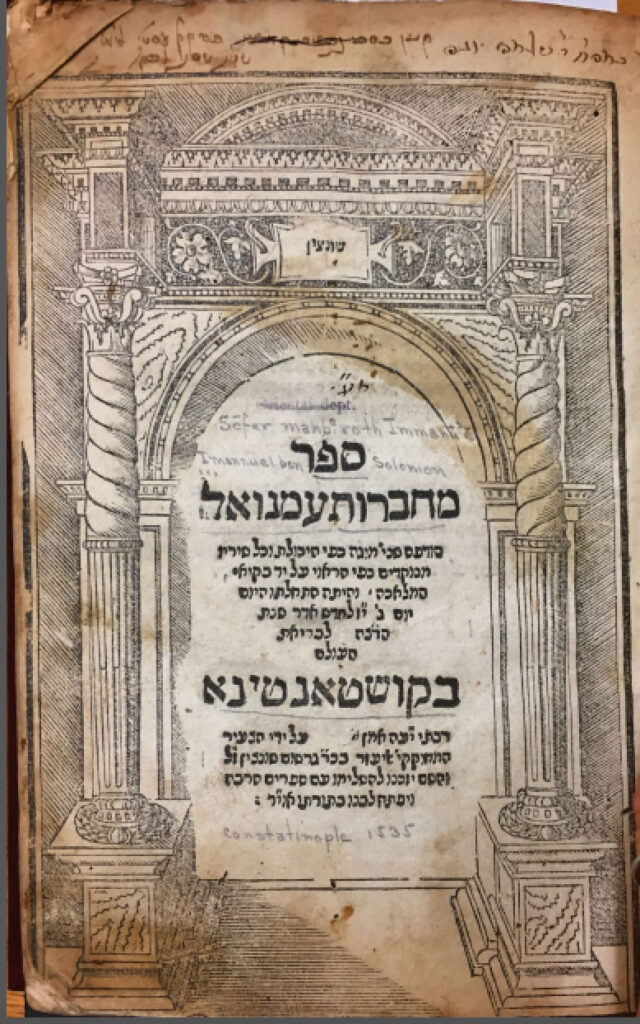
Sefer Maḥberot ʻImanuʼel : hudpas sheni’ mugah kefi ha-yekholet ṿe-khol shiraṿ menuḳadim, Immanuel ben Solomon, published in Constantinople in 1535. (Columbia Rare Book and Manuscript Library Special Collections, call # B893.2 IM6 O.)
The Maḥbarot Immanuel comprises twenty-eight chapters on a variety of topics ranging from poetic competitions to thematic comparisons, and from erotic love to social commentary. All of the stories are a mixture of rhymed prose and metered verse, except for the final one, Tofet ve-ʿeden (Hell and Paradise), a rhymed prose text with no poetic passages. (For a translation into English, see Tophet and Eden (Hell and Paradise), trans. Gollancz; for analysis of contents, see “Situating Hell & Heaven: Immanuel of Rome’s Mahberet Ha-Tophet V’ Ha-Eden,” Fishkin.)
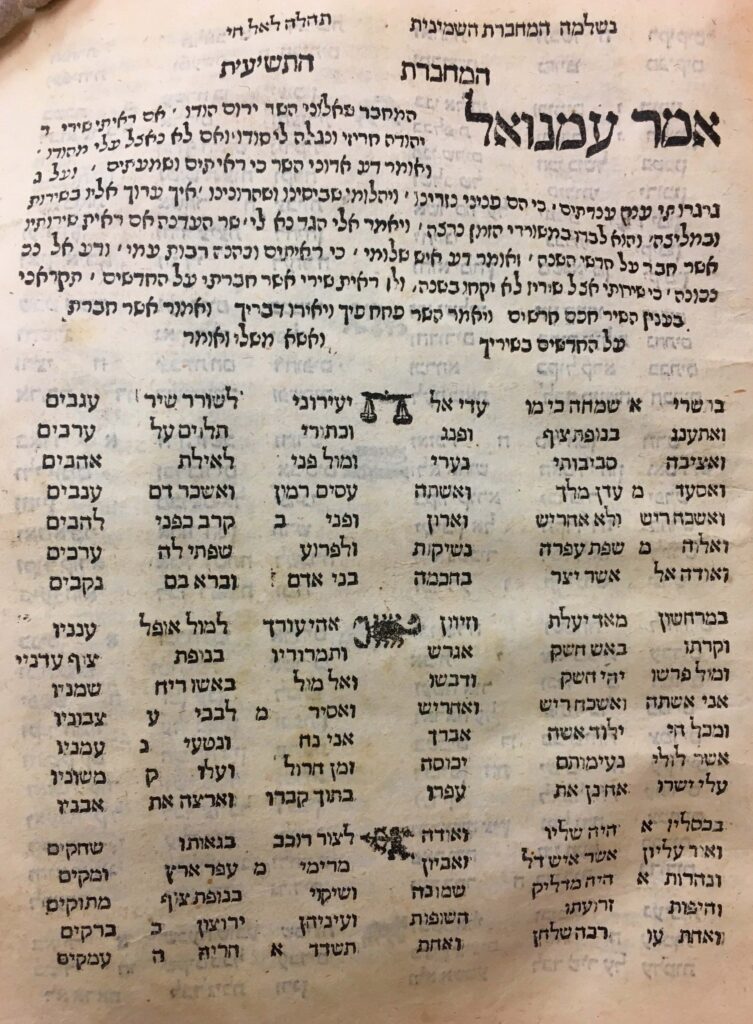
Each maḥberet, or story, of the collection opens with the phrase pictured here (“ʾamar Immanuel”), translated as “Immanuel said,” or with the phrase “The narrator said.” The 1491 Brescia incunabulum of the Maḥbarot Immanuel contains lovely depictions of the zodiac signs to accompany Immanuel’s discussion of the months of the year in the opening of the ninth maḥberet of his collection. Jewish interest in the zodiac dates to Jewish cultural contacts with the Romans: archeologists unearthed zodiac signs on mosaic floors of ancient synagogues (see Hachlili, “The Zodiac in Ancient Jewish Art: Representation and Significance”). Pertinent to the discussion of Immanuel of Rome, the zodiac continued to captivate the imaginations of Jewish authors through the medieval period, making frequent appearances in writing from Immanuel’s time. (Columbia Rare Book and Manuscript Library, call # Goff Heb-43)
Scholars have argued that Immanuel used the Divine Comedy as his inspiration for Tofet ve-ʿeden (Hell and Paradise). In Tofet ve-ʿeden, a certain Daniel (a Hebraized version of ‘Dante’ or a reference to the biblical prophet Daniel, according to those who have analyzed the text as an imitation of the Divine Comedy, Gollancz, p. 6) leads pilgrim Immanuel through hell and heaven, and the two characters encounter both biblical and modern figures in these realms. Immanuel is likely to have borrowed this narrative framework from Dante, omitting purgatory, which does not exist in Jewish theology. Yet Immanuel’s text—which is merely one in a collection of twenty-eight stories—is more descriptive narration than philosophical journey of poetic innovation and socio-political critique. Though not one to be humble, Immanuel may have realized the difficulty in trying to ‘translate’ the Divine Comedy for his Jewish readers. Or, conversely, perhaps Immanuel felt he could do justice to the entire Divine Comedy in one segment of his story collection. (For a comprehensive essay on Immanuel and other Italian Jewish authors who quoted and/or translated works by Dante and referred to Dante by name, see “A Matter of Quotation: Dante and the Literary Identity of Jews in Italy,” Salah.)
The formal aspect of Tofet ve-ʿeden that truly sets it apart from the other stories in the Maḥbarot is its rhymed prose structure that lacks interspersed rhymed metered poems, a formal feature present in all other stories in his collection and customary in all Arabic and Hebrew maqamas. Although to the modern reader rhymed prose might seem to fall somewhere between the categories of poetry and prose, it was technically a variety of prose in classical Arabic and medieval Hebrew, generally reserved for writing that required eloquence, such as formal epistles. As ornate prose, it is not easily comparable to Dante’s terza rima, even though maqama authors prided themselves on achieving compositional virtuosity. In fact, other stories in Immanuel’s collection, such as the 20th mahberet, are more attuned to poetic achievement than its final installment. Tofet ve-ʿeden thus seems to be more of an experiment in thematic rather than poetic emulation of the Divine Comedy for Immanuel’s Jewish readers.
Before taking a closer look at Immanuel’s Hebrew sonnets, I pause to explain the nature Immanuel’s Hebrew writing. Hebrew was not a spoken language at this time; Immanuel’s Hebrew writing follows in the tradition of Andalusian Jews who, in the Golden Age of Hebrew letters (ca. 950-1150), spoke Arabic, wrote poetry in biblical Hebrew, and wrote philosophical, medical, scientific, grammatical, literary, and mathematical treatises in Judeo-Arabic (i.e., Arabic in Hebrew letters). By Immanuel’s time, grim realities had pushed Jews out of Southern Spain to Northern Spain (though not hospitable for long), Southern France, Italy, North Africa, and elsewhere. Learned Andalusian Jews brought scholarly works with them and translated them from Arabic and Judeo-Arabic into Hebrew to reach non-Arabic readers. Though we have no evidence whatsoever that Immanuel’s family came from Iberia (Jews were established in Rome as early as 139 BCE; Stern, “Roman Literature,” Encyclopedia Judaica), Immanuel’s generation of Roman Jews studied and embraced Andalusi intellectualism via its Hebrew translations. Thus, when writing in Hebrew, Immanuel, like his Andalusian predecessors, relied on biblical Hebrew and was well aware of philosophical translations and commentaries. This multilingual scenario carries with it significant hermeneutic implications.
Immanuel’s Hebrew Sonnets
Immanuel’s Maḥbarot Immanuel boasts thirty-eight Hebrew sonnets, making it the first language to claim a sonnet in its repertoire following the form’s invention in Italian. To compose a sonnet in Hebrew, Immanuel forged what Dvora Bregman describes as a new kind of “quantitative-syllabic” meter that combined elements of both Hebrew (via Arabic) quantitative meter and Italian syllabic meter (Bregman, The Golden Way, trans. Brener, p. 32). Secular and liturgical Hebrew poetry composed in Islamic Spain and later in Christian Spain was based on a quantitative metrical system that Jewish poets in tenth-century al-Andalus adopted from Arabic poetry, though it is not a natural fit for Hebrew verse (Weiss, et. al., “Poetry,” Encyclopedia Judaica). After initial objections to the use of Arabic poetics in secular, and subsequently liturgical, Hebrew compositions, the use of Arabic quantitative meter became the convention for Jewish poets across the medieval Mediterranean, such that Immanuel utilized this system without even knowing Arabic.
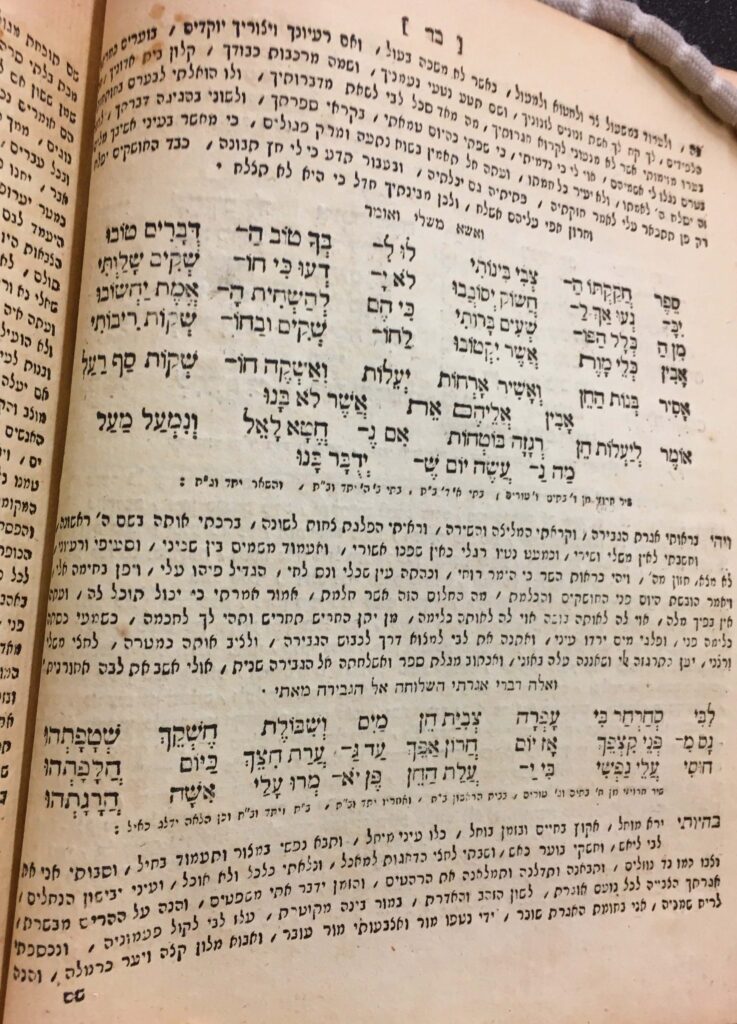
This edition of the Maḥbarot Immanuel was published in Berlin in 1796. (Columbia Rare Book and Manuscript Library, call # 893.2 Im6 I)
Immanuel’s ability to “translate” the form of the sonnet into Hebrew—all while maintaining medieval Hebrew poetry’s convention of quantitative meter—demonstrates his keen familiarity with compositional techniques in vernacular Italian. Beyond formal characteristics, Immanuel’s Hebrew sonnets likewise reveal his deep understanding of the thematic and linguistic components of the early-fourteenth-century sonnet.
An instance of Immanuel’s adaptation of a stilnovist-themed sonnet from Italian to Hebrew appears in the third maḥberet (story) of his Maḥbarot Immanuel, a story that in most manuscripts and print editions of the text is titled megilat ha-ḥesheq (The Scroll of Love). In the story, Immanuel as narrator and protagonist describes what ensues when his patron goads him into courting a beautiful nun. In the courting process, Immanuel and the nun exchange ten poems, four of them sonnets.
Immanuel eventually wins the nun’s affections with a poem so spectacular (incidentally not an Italian poetic form) that she regrets all of her time wasted in prayer and promises to run away with him. Immanuel, however, must break off the correspondence when he learns that his patron is the nun’s half-brother and will refuse to patronize Immanuel further if he continues the relationship. The heartbroken nun stops eating and subsequently dies, and the maqama concludes with a sonnet in which Immanuel laments her death:
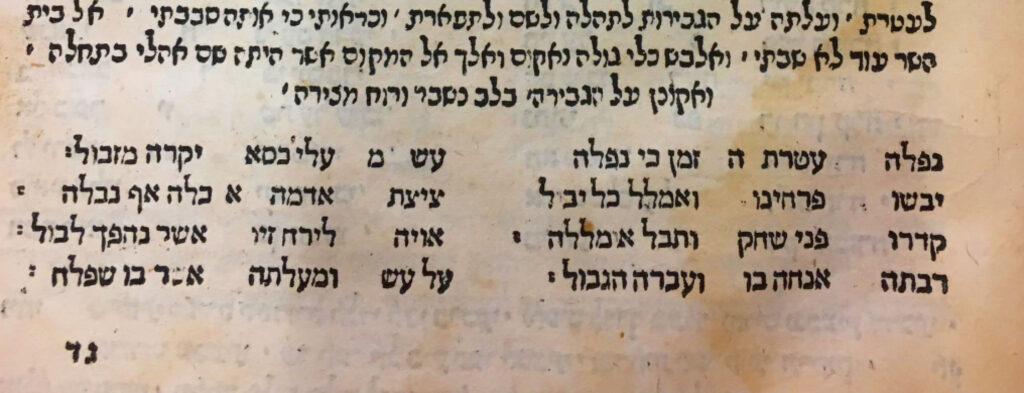
The sonnet as it appears in the 1491 Brescia edition of the Mahbarot. Vocalization was added to the rhymed and metered poetic portions of the Constantinople text, while the Brescia was not vocalized. In both editions, the rhymed prose appears in Sephardic semi-cursive script that was adopted for use in print editions, while the rhymed and metered poems appear in square script. The graphic distinction between rhymed prose and poetry might reflect a secularized adaptation of the scribal and typographical practice for liturgical Hebrew texts, in which square script was used for sacred text and semi-cursive for commentary [see Beit-Arié, “The Relationship between Early Hebrew Printing and Handwritten Books: Attachment or Detachment”]. (Columbia Rare Book and Manuscript Library, call # Goff Heb-43)

Here is the above sonnet as printed in the Constantinople edition of 1535. (Columbia Rare Book and Manuscript Library, call # B893.2 IM6 O)
¯ ¯ ˘ ¯ ¯ ¯ ˘ ¯ ¯ ¯ ˘ ¯ nafela ʿaṭeret ha-zeman, ki nafela ʿash meʾale khiseʾ yeqarah mi-zevul yaveshu feraḥenu ve-umlal kol yevul, tsitsat adama af navela. qaderu fene shaḥaq ve-tevel umlela, oya leyearḥ ziv asher nehpakh levul! raveta anaḥa vo ve-ʿavera ha-gevul, ʿal ʿash u-maʿlata, asher bo shafela. ʿash! baʿavurekh ohava ha-maveta, ma mateqa miyom asher bakh daveqa, ma nifleʾa mavet beʿash hitḥabera; lo hitmuta maʿalatekh moteta, akh ha-temuta hi ve-mitqekh mateqa, ʿal tsuf ve-yaʿrat ha-devash hitgabera! (Maḥbarot Immanuel, ed. Jarden, vv. 550-563)
The glory of Time has fallen, for from her throne Has fallen the star most valued on High Our flowers have perished, the harvest is dry Upon the bare earth buds wither and moan. The heavens are darkened, the world’s left alone Alas! the moon’s splendor is now dark in the sky Naught has been left but the sound of a sigh For the glorious star now dethroned. Bright star! Death shall I love for thy sake: How sweet it becomes, enjoined unto thee; How wondrous is Death, bound to this star. ‘Tis not that Death did overtake Thy glory but that Death is sweetened by thee And thy sweetness, that exceeds nectar by far! (trans. Brener, “The Scroll of Love,” Prooftexts 32.2, pp. 161-2.)
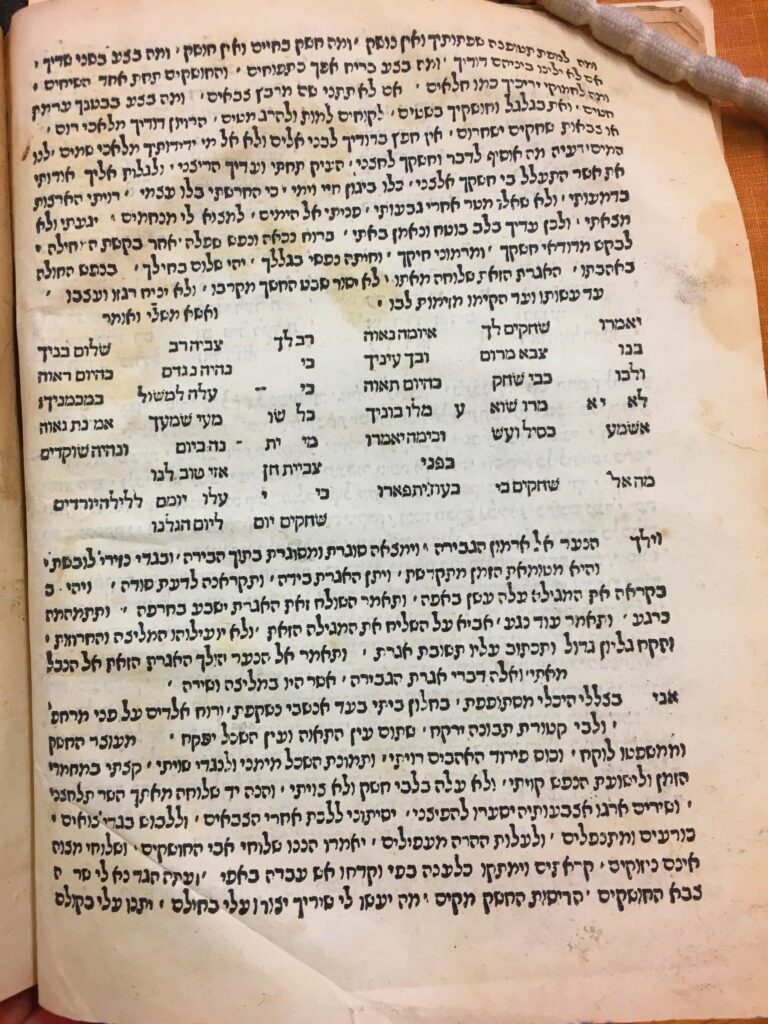
The first line of the sonnet addresses Immanuel’s beloved: “The heavens say to you, lovely woman:” [yomeru sheḥaqim lakh, ayuma naʾava; Maḥbarot Immanuel, 50, line 124. For a full translation, see Brener, “The Scroll of Love,” Prooftexts 32.2, p. 157.] While the Hebrew rhymed prose that precedes this sonnet dwells on the unattainability of the nun, in this sonnet Immanuel instead focuses on how the beauty of the beloved puts the Heavens to shame. By the time Immanuel composed this sonnet, the stilnovist poet’s figuration of Heaven as emotionally invested in the lady was a poetic convention, but Immanuel’s use of this trope in Hebrew was unprecedented. (Columbia Rare Book and Manuscript Library, call # Goff Heb-43)
ch’io dicea: —Morte, assai dolce ti tegno; tu dei omai esser cosa gentile, poi che tu se’ ne la mia donna stata
that I said: —Death, in great sweetness I hold you; you must hereafter be a noble thing, because you have been in my lady (Donna pietosa, VN 23-27, Trans. Cervigni and Vasta)
The first tercet of Immanuel’s sonnet, like these verses from Dante’s canzone, admits jealousy of anthropomorphized Death, who has held the poet’s lady closer than the poet himself. The real possibility that Immanuel saw the Vita Nuova in manuscript form could explain this near translation of Italian to Hebrew (Castellani, “Sul codice Laurenziano Martelliano 12”; Roth, “New Light on Dante’s Circle,” 28; thanks to Teodolinda Barolini, Wayne Storey, and Martin Eisner for their input into the question of transmission of the Vita Nuova, via email, October 2012).
Yet Immanuel was not merely copying and translating; he clearly understood vernacular Italian lyrics well enough to formulate them in Hebrew both structurally (in this case moving from canzone to sonnet and composing the sonnet to adhere to quantitative and syllabic meters) and thematically (representing anthropomorphized Death and divine jealousy of the beloved, for instance). Further, he works this poem seamlessly into the larger narrative framework of the third story of the Maḥbarot Immanuel.
Because Immanuel is the only Jewish poet of this era with extant Italian lyrics, it is difficult to gauge how aware Immanuel’s Hebrew readers were of his innovative use of Italian forms in the Maḥbarot Immanuel. Regardless, the Maḥbarot Immanuel was a tremendously popular work that spread rapidly with the invention of the printing press. Indeed, it became famous enough to be banned in the sixteenth-century Code of Jewish Law (Shulḥan ʿArukh, literally Prepared Table) for reading on the Sabbath, due to its licentious contents (Shulḥan ʿArukh ʿOraḥ Ḥayim 307.16).
Immanuel’s Vernacular Italian Poetry
Immanuel wrote five poems in Italian—four sonnets and Bisbidis. Three of the sonnets are standalone and the fourth is part of a tenzone with Bosone da Gubbio to eulogize Dante’s death.
Few scholars have commented on these sonnets with respect to Italian poetics and Immanuel’s Jewish identity; exceptions are Fabian Alfie (“Immanuel of Rome, Alias Manoello Giudeo: The Poetics of Jewish Identity in Fourteenth-Century Italy,”) and Wout van Bekkum (“The Emperor of Poets”).
In addition to these lyrics, there is a tenzone of dubious attribution, purportedly between Cino da Pistoia and Bosone da Gubbio, on the occasion of Immanuel’s death. Questions of attribution aside, the fact that two Christian Italian poets exchanged sonnets upon Immanuel’s death suggests that Immanuel was known well enough to be eulogized. In this case, however, the poets, especially the one claiming to be Cino, take the exchange as an opportunity to assess where Immanuel and Dante now reside in the afterlife. It is not a positive exchange, but it is recognition, nonetheless. Though gleaning personality from fictional writing is generally unproductive, it seems likely that Immanuel would have reveled in any attention, regardless of tone.
Immanuel’s Italian Sonnets
The Italian is from Marti’s edition of Poeti giocosi del tempo di Dante (Milano: Rizzoli, 1956); translations are my own.
Amor non lesse mai l’avemaria; Amor non tenne mai legge né fede; Amor è un cor, che non ode né vede e non sa mai che misura si sia. Amor è una pura signoria, che sol si ferma in voler ciò che chiede; Amor fa com’ pianeto, che provvede, e sempre retra sé per ogni via. Amor non lassò mai, per paternostri né per incanti, suo gentil orgoglio, né per téma digiunt’è, per ch’ i’ giostri. Amor fa quello di che più mi doglio: ché non s’attène a cosa ch’io li mostri, ma sempre mi sa dir:—Pur così voglio—
Love never read the ‘Hail Mary.’ Love never held to laws or faith. Love is a heart, which doesn’t hear or see: Love never knows measure or limit. Love is absolute lordship, which is determined to get what it wants; love is like a planet, exerting its influence, while always becoming more distant. Love never leaves behind its pride, ceding neither to 'Our Fathers' nor to incantations. Nor will it uncleave, though in fear I struggle. Love does that which pains me most: for without attending to what I say, Love always says, “This is what I want!”
Though an explication of this sonnet could span many pages, I limit myself to two comments that are particularly relevant in the context of Digital Dante. First, on the use of the liturgical terms ‘avemaria’ and ‘paternostri’: Immanuel could have chosen words or phrases without Christological significance to convey similar meanings. As is, Immanuel lets his reader know that he is familiar enough with Christian customs and vocabulary to incorporate them into his parodic sonnet. Second, the repetition of ‘Amor’ in the opening of the sonnet recalls the repetition of Amor in Francesca’s answer to Dante in Inferno 5: Amor, ch’al cor gentil ratto s’apprende,/ Amor, ch’a nullo amato amar perdona,/ Amor condusse noi ad una morte (Inf. 5.100, 103, 106; Petrocchi edition). Not wanting to be outdone by a Trinitarian-tinged reference to love, Immanuel continues the repetition of Amor in the first verses of the remaining stanzas. That Paolo and Francesca fell in love while reading adds further meaning to Immanuel’s opening verse of Love never reading the Hail Mary.
The next sonnet moves from a parody of love to that of politics and religions:
Io* steso non mi conosco, ogn’om oda, che l’esser proprio si è ghibellino: e ’n Roma so’ Colonnes’ed Ursino, e piaceme se l’uno e l’altro ha loda. Ed in Toscana parte guelfa goda; in Romagna so’ ciò ch’è Zappettino; mal giudeo sono io, non saracino: ver’ li cristiani non drizzo la proda. Ma d’ogni legge so’ ben desiroso alcuna parte voler osservare: de’ cristiani lo bever e ’l mangiare, e del bon Moisès poco digiunare, e la lussuria di Macón prezioso, che non tèn fé de la cintura in gioso.
I don’t know who I am! Everyone listen! My very being is a Ghibelline. In Rome I’m for the Colonnas and the Orsinis: I’m happy when they’re praised. And in Tuscany, may the Guelfs win. In Romagna I am what Zappettino is. I’m a bad Jew. But I’m not a Saracen, and I don’t want to follow the Christians. I would, however, like to observe a part of each religion’s laws: of the Christians, the drinking and eating; and like good Moses, I’ll only fast occasionally, and like precious Muhammad, I’ll go for lechery, since from the belt down, that one doesn’t follow any faith.
*Marti’s edition reads “In steso non mi conosco,” but the Vat. Barb. Lat. 3953 reads “eu,” or io, which seems to make more sense here. Here I rely on Debenedetti, who in 1904 referred to the Vat. Lat. Barb. 3953, proposing “ensteso” as a modification of “eu stesso” (“I sonetti volgari di Immanuele Romano,” p. 11).
Here, Immanuel moves deftly from the political to the theological: he informs the reader that he is just as adept at deciphering the political factions and key families of fractured Italy as he is at distilling his favorite qualities of the three monotheistic faiths into stereotypes. In formulating his poem in this manner, Immanuel himself seems to be playing into the stereotype that his Christian readers likely want to hear, i.e., that he is gluttonous, lustful, and generally lazy. He is a bad Jew, as he flippantly announces. Underlying this parade of conventions is, of course, the fact that Immanuel is the poet; he is in a position of power.
His parody of the political and the theological also points to his generally grim view of humanity, a theme that likewise surfaces in Bisbidis, in his half of the tenzone with Bosone da Gubbio, and in the following sonnet:
Se san Pietro e san Paul da l’una parte, Moisès ed Aaròn da l’altra stesse, Macón e Trivican, ciascun volesse ch’eo mi rendesse a volontà né a parte; ciascun di lor me ne pregasse en sparte: duro mi pare ch’eo gli ne credesse, se non da dir a chi me’ mi piacesse: —Viva che vince, ch’io so’ di sua parte!— Guelfo né ghibellin, nero né bianco; a chi piace il color, quel se nel porte: che ferirò da coda e starò franco. E mio compar tradimento stia forte: ch’ i’ di voltar mai non mi trovo manco e aitar ciascun che vince, infin a morte.
If St. Peter and St. Paul are on one side, Moses and Aaron on another, Mohammad and Trivican* on another, each one wants me to surrender to him whole. Each one of them pleads with me separately: it's hard to think that I could believe one of them, but only declare the one who pleases me most. Long live the winner, and I will be on <em>that</em> side! Guelph or Ghibelline, Black or White, Everyone who likes a color, let him wear it: I will stay in the background and remain free. Let my companion treason stay strong; for I never fail in being a turncoat, and until my dying day, I’ll help the winner.
*Trivican(o) is a term for a deity that medieval Christians associated with Muslims.
Moving in the opposite trajectory of the previous sonnet Immanuel begins this sonnet with the theological and then works towards the political (Debenedetti, p. 12). Yet unlike the conspicuous name-dropping in the previous sonnet, here he does not seem to be as concerned with his readers’ expectations of his knowledge of Italian politics. In fact, he names them to undermine their importance: he treats the religious and the political with equal irreverence, admitting his willingness to side with the most profitable group.
There are a couple of factors that set Immanuel’s sonnet apart from a typical political parody. First, Immanuel writes as if he were an insider, knowledgeable about each group he mentions, when in reality, he was an outsider: Judaism was never a consequential competitor with respect to Christianity and Islam, and Jews were irrelevant in the forum of local politics. Second, Immanuel is willing to risk identifying himself as disloyal, even in the relatively low-risk context of parodic lyric.
In pre-ghetto Italy and despite certain official rulings (such as the 1321 papal edict), Immanuel had the relative freedom to travel and converse with others, as long as he possessed the resources that such a lifestyle required. Even so, his seemingly independent existence does not translate to legitimacy among fellow poets and/or politically active compatriots. For these reasons, this sonnet strikes me as particularly precarious despite its intentional parody, though perhaps Immanuel’s contemporaries found humor rather than incriminating evidence in its outsider pessimism.
Tenzone: Immanuel and Bosone da Gubbio
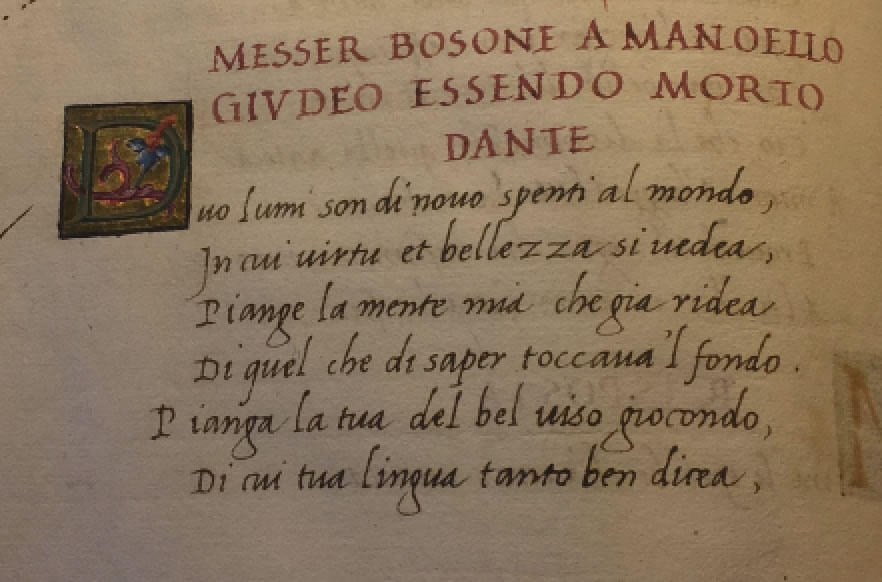
Personal research photograph of Biblioteca Casanatense Ms. 433, Raccolta di rime di autori italiani del Duecento. Several parts of this manuscript have been digitized by the Biblioteca Casanatense but the tenzone between Bosone and Immanuel has not.
Bosone da Gubbio to Immanuel:
Duo lumi son di novo spenti al mondo in cui virtù e bellezza si vedea; piange la mente mia, che già ridea, di quel che di saper toccava il fondo. Pianga la tua del bel viso giocondo, di cui tua lingua tanto ben dicea; omè dolente, che pianger devea ogni omo che sta dentro a questo tondo. E pianga dunque Manoel Giudeo: e prima pianga el suo proprïo danno, poi pianga ’l mal di questo mondo reo; ché sotto 'l sol non fu mai peggior anno. Ma mi conforta ch’i’ credo che Deo Dante abbia posto ’n glorïoso scanno.
Two lights are recently extinguished from the world in whom we used to see virtue and beauty; my mind weeps, which one time laughed, for one whose knowledge plumbed the depths. Let your mind weep for the beautiful face, of whom your tongue used to speak so well. Oh sorrowful me- for every man who lives upon this globe should weep. And so let Manoel Giudeo weep: and let him weep first for his own loss; then for the evil of this guilty world: for under the sun was never a worse year. But it comforts me to know that I believe that God has placed Dante in a glorious seat in Paradise.
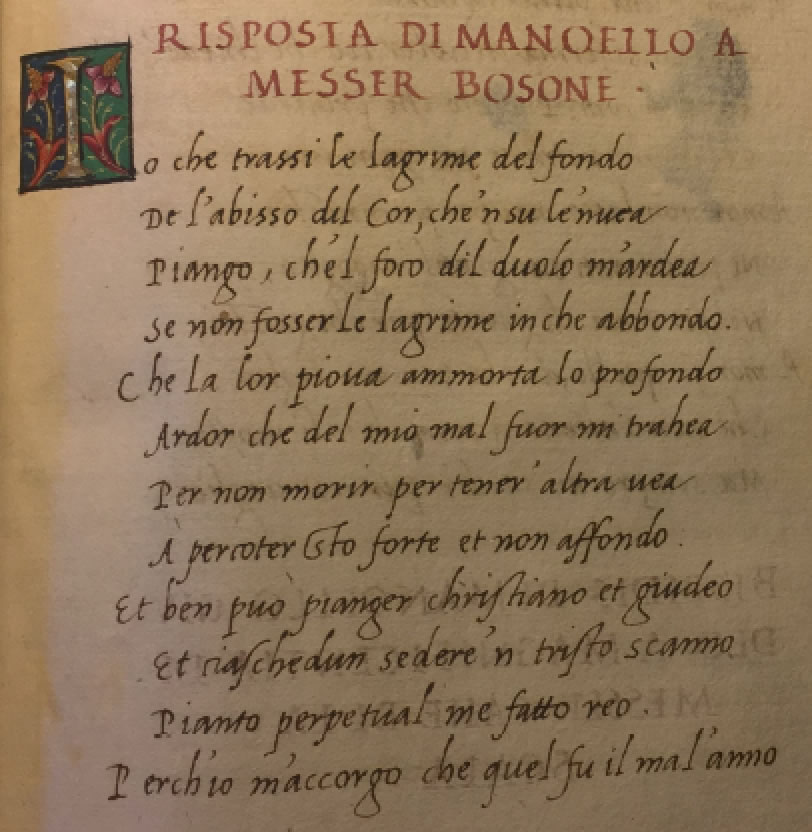
Personal research photograph of Biblioteca Casanatense Ms. 433, Raccolta di rime di autori italiani del Duecento. Several parts of this manuscript have been digitized by the Biblioteca Casanatense but the tenzone between Bosone and Immanuel has not.
Immanuel to Bosone da Gubbio:
Io, che trassi le lagrime del fondo de l’abisso del cor che ’n sù le ’nvea, piango: ché ’l foco del duolo m’ardea, se non fosser le lagrime in che abbondo. Ché la lor piova ammorta lo profondo ardor, che del mio mal fuor mi traea; per non morir, per tener altra vea, al percoter sto forte e non affondo. E ben può pianger cristiano e giudeo, e ciaschedun sedere ’n tristo scanno: pianto perpetüal m’è fatto reo. Per ch’io m’accorgo che quel fu il mal’anno: sconfortomi ben, ch’ i’ veggio che Deo per invidia del ben fece quell danno.
I, who carry tears from the depth of the abyss of my heart, bringing forth tears and weep: how the flame of pain would burn me, if it weren’t for the tears that I abound in. The rain of my tears quenches the profound ardor, which was pulling me out of my life, so that I don’t die, so that I have another way, I stand firm to the blows and do not drown. Christian and Jew alike can cry, each one sitting sad and desolate: this catastrophe has cost me in perpetual tears. Now I know that was an evil year: I am greatly disheartened to see that God, jealous of human goodness, brought about this loss.
Before moving to the sonnets, I’ll offer a brief comment on the legacy of this poetic exchange: this tenzone has prompted many scholars to make the not impossible yet entirely unfounded claim that Immanuel shared a close friendship with Dante. Without evidence, this speculation is unproductive and even distracts from the fact that Immanuel was in communication with Bosone, a minor poet and politician. Though Immanuel’s whereabouts remain unclear, the manuscript tradition situates him in Gubbio (“Manuel Giudeo da Gobbio” in the Vat. Lat. Barb. 3953, index of poets). These facts—the tenzone and Immanuel’s affiliation with Gubbio—attest to Immanuel’s rapport with at least one Italian Christian poet.
Bosone and Immanuel take decidedly different approaches to lamenting the same deaths. As a way of explaining “duo lumi,” scholars have proposed that Immanuel could have suffered the loss of his wife (or another loved one) alongside the loss of Dante. Perhaps the additional personal loss Immanuel suffered explains his overwhelmingly pessimistic tone in response to Bosone’s relatively accepting stance, or perhaps his pessimism was an innate personal quality, here merely fueled by death.
Bosone’s address to Immanuel follows the expected path of an elegy, moving from mournful to hopeful: at first, Bosone miserably perceives the world’s loss of Dante’s wisdom, but by the end of the sonnet, he has found solace in imagining that God has granted Dante a “glorioso scanno” in heaven. Yet Bosone’s lamentation is not entirely orthodox: he remarkably highlights Immanuel’s personal state of mourning. He draws attention to the bereft Manoel Giudeo, who is left as a solitary, grieving figure. In essence, Bosone gives Immanuel permission to mourn Dante’s death, and in so doing, simultaneously acknowledges Immanuel’s humanness and invites his poetic response.
Immanuel seizes Bosone’s invitation, depicting himself as the grieving “Manoel Giudeo” of Bosone’s sonnet, but he quickly veers from the path of Bosone’s mourning to reaffirm his right to lament Dante’s death: “E ben può pianger cristiano e giudeo.” Immanuel momentarily puts aside his personal woe to highlight shared grief across religious boundaries; as a Jew, Immanuel has experienced the loss of Dante as profoundly as any Christian has. Immanuel’s notion of mourning as an equalizer across faiths justifies his poetic voice, giving him the right to respond to Bosone as a fellow mourner. Yet this glimmer of inclusion gives way to deprivation, once again, as Immanuel identifies God as the source of this suffering: “Deo/ per invidia del ben fece quel danno.” Though God’s jealousy of a beloved was a lyric convention by this time, God’s jealousy of a recently deceased non-beloved is unexpected. What Bosone imagines as Dante’s “glorioso scanno” becomes a “tristo scanno” (Vitale, p. 550, n. 10) in Immanuel’s despairing, ultimately lonely, response.
Immanuel’s Bisbidis
Del mondo ho cercato-per lungo e per lato con caro mercato-per terra e per mare. Vedut’ho Soria-infin Erminia, e di Romania-gran parte, mi pare. Vedut’ho ’l Soldano-per monte e per piano e sì del Gran Cano-poria novellare. Di quel ch’aggio inteso-veduto e compreso, mi sono ora acceso-a volerlo contare; ché pur la corona-ne porta Verona, per quel che si suona - del dire e del fare. Destrier’ e corsiere-masnade e bandiere, coracce e lamiere-vedrai rimutare Sentirai poi 'l giach,-che fan quei pedàch, giach giach giach,-quando gli odi andare. Ma pur li tormenti-mi fan li strumenti, ché mille ne senti-in un punto sonare: Dudùf dudùf-dudùf dudùf dudùf dudùf-bandiere sventare. Qui vengon le feste-con le bionde teste; qui son le tempeste-d’amore e d’amare. Le donne muz muz-Le donzelle usu usu le vedove sciuvi vu;-ti possa annegare! Poi trovan fantesche-tuttora più fresche a menar le tresche,-trottare ed ambiare. L’una fa: “Cosi?”;-e l’altra: “Pur sì”; e l’altra: “Sta qui,-ch’io vo per tornare”. In quell’acqua chiara,-che ’l bel fiume schiara la mia donna cara-vertù fa regnare; ch’Amor è ’n la sala-del Sir de la Scala. e quivi senza’ala-mi parea volare; ch’io non mi credea-di quel ch’ i’ vedea, ma pur mi parea-in gran mare stare. Baroni e marchesi-de tutti i paesi, gentili e cortesi-qui vedi arrivare; quivi Astrologia-con Filosofia e di Teologia-udrai disputare; e quivi Tedeschi,-Latini e Franceschi, Fiammenghi e Ingheleschi-insieme parlare; e fanno un trombombe-che par che rimbombe a guisa di trombe,-chi ’n pian vòl sonare. Chitarre e lïuti-vïole e flaùte, voci alt’ed agute,-qui s’odon cantare. Stututù ifiù ifiù ifiù-stututù ifiù ifiù ifiù stututù ifiù ifiù ifiù-tamburar, zuffolare. E qui bon cantori-con intonatori e qui trovatori-udrai concordare. Quivi si ritrova-mangiatori a prova, che par cosa nova-a vederli golare. Intarlatìn-intarlatìn intarlatìn-ghiribare e danzare. Li falconi cui cui-li bracchetti gu gu, li levrieri guuu uu-per volersi sfugare. E qui falconieri-maestri e scudieri, ragazzi e corrieri,-ciascun per sé andare. E quanto e quanto-e quanto e quanto e quanto e quanto-li vedi spazzare. E l’uno va sù-e l’altro vèn giù; tal donna vèn giù,-che non lassa passare: Bis bis bis,-bisbidis disbidìs Bisbisbidìs-udrai consigliare. E qui babbuini,-Romei e pellegrini Giudei e Sarracini-vedrai capitare. Tatìm tatìm-tatìm tatìm, tatìm tatìm,-senti trombettare. Balaùf balaùf-balaùf balaùf, Balaùf balaùf-udrai tringuigliare. Di giù li cavalli,-di sù i pappagalli, su la sala li balli,-insieme operare. Dududù dududù-dududù dududù dududù dududù,-sentirai naccherare. Ma quel che più vale,-e al Sir non ne cale, veder per le scale-taglier trafugare, con quel portinaro,-che sta tanto chiaro, che quel tien più caro-che me’ ne sa fare. E qui de ragazzi–vedut’ho solazzi, che quel cotai pazzi-non vidi muffare. Qui non son minazze,-ma pugna e mostazze, e visi con strazze-e occhi ambugliare. Gegegì gegegì-gegegì gegegì gegegì gegegì,-gli uccelli sbernare. Istruzzi e buovi,-selvaggi ritrovi, ed animai novi-quant’uom pò contare. Qui sono leoni,-e gatti mammoni, e grossi montoni–vedut’ho cozzare. Bobobò bobobò,-bottombò bobobò, bobobottombò bobobottombò,-le trombe trombare. Quivi è un vecchiume-che non vede lume, ché largo costume-li fa governare. Qui vèn poverame-con sì fatte brame, ch’el brodo col rame-si vòl trangugiare. Quivi è una schiera-di bordon di cera, che l’aere la sera-si crede abbruciare. Tatàm tatàm-tatàm tatàm, tatàm tatàm-e’ liuti tubare. Qui sono gran giochi-di molti e di pochi, con brandon di fochi–vedut’ho giostrare. Qui vengon villani-con sì fatte mani, che paiono alani-di Spagna abbaiare. Qui son le simie-con le molte alchìmie: grattarsi le timie-e voler digrignare; E di un riso: che c’è?-che c’è? che c’è? heee heee heee heee; ogni uom vuol crepare. Qui son altri stati-sì ben divisati, che tra li beati-sen può ragionare. E questo è ’l signore-di tanto valore, che ’l suo grande onore-va per terra e mare.
I’ve searched the world-long and wide by land and by sea- with little reward. I saw Syria all the way to Armenia and Romania, a large part of it, it seems to me. I saw the Sultanate from the mountains to the valley And I can tell you about the Great Khan: of all I heard and saw and understood, now I am inflamed to want to recount: the only place that holds the crown is Verona, renowned for its words and deeds. You'll see knights in armor and cavaliers switching their steeds and flags, coats of arms and weaponry. You’ll hear the giach of their armored feet: pedach giach giach giach…as you hear them go by. And their weapons become instruments, thousands of weapons, sounding off at once: Duduf, duduf - duduf, duduf duduf, duduf - the flapping of flags. Here we have parties, with all the blond ladies: here come the storms of bitter love and of loving! The matrons go muz muz, the maidens usu usu and the widows sciuvi vu - their chatter drowns out everything else! Here you find maids, ever fresh, Feverishly skipping - trotting and walking along. One says, ‘like this?’ - and the other ‘like that’ and the other ‘stay here, since I’m coming back.’ In that clear water, which makes the beautiful river shine, my dear lady causes virtue to reign. For love is in the hall of Cangrande della Scala: and here without wings, seemingly I fly; I could barely believe what I was seeing, but indeed it seemed to me to be in a great sea. Barons and marquises from every land noble and courtly: see them arrive here. Here astrology mingles with philosophy and theology - you’ll hear it debated; Here Germans, Italians and French, Flemish and English, speaking together: They make echoes that reverberate like a drum, that slowly builds momentum. Guitars and lutes, violas and flutes: loud, shrill voices - here you hear them sing. Stututu ifiu ifiu ifiu - stututu ifiu ifiu ifiu stututu ifiu ifiu ifiu - drumming, whistling. And here good singers and minstrels, and here troubadours - hear how they complement each other. Here you’ll find eaters contesting-- it's a rare treat, to watch them indulge Intarlatin - intarlatin Intarlatin - playing and dancing. The falcons with their cui cui, the mastiffs go gu gu; the greyhounds guuu uu - to make an escape. And the falconers, masters and squires, Boys and messengers, each one goes his own way. How much and how many, and how much and how many And how much and how many- you see them rush by: one goes up and the other comes down; that lady comes down - she won’t let you pass: Bis bis bis, bisbidis disbidis Bisbisbidis - you’ll hear her advise. And here fools and pilgrims to Rome and elsewhere, Jews and Muslims, see how they all arrive. Tatim tatim - tatim tatim, tatim tatim - hear the drumming! Balauf balauf - balauf balauf, balauf balauf - you hear it trill here and there. Below are the horses - above the parrots, in the room they dance, moving together. Dududu dududu - dududu dududu dududu dududu - reverberating around you. But the most costly things - to Cangrande they're nothing: see across the stairs how they steal the precious plates. With that doorkeeper, who is so sure of his position what he holds most dear, he knows best what to do. And here the young men: I have seen such entertainment, you won't see such crazy youths growing mold anytime soon. Here they’re not shy throwing punches and slaps, some with black eyes, some bruises. Gegegì gegegì gegegì gegegì Gegegì, gegegì - the birds twitter in springtime. Cranes and cows - wild animals you will find, and strange exotic beasts - more than one can count. Here are lions, and monster cats and enormous rams - I saw them butting heads. Bobobo bobobo - bottombo bobobo bobobottombo bobobottombo - the trumpets sound. Here’s a large band of the old, the half-blind: the generosity [of Cangrande] keeps them going. Here comes the band of the indigent, so full of hunger, they would gulp down the copper bowl with the broth. Here is such an assembly of wax candlesticks that they seem to burn the evening air. Tatam tatam - tatam tatam tatam tatam - lutes twitter along. Here are great games - some for many, some for few, with huge firebrands I’ve seen them joust. Here come the lowly peasants - whose hands are such, that they seem to be huge guard-dogs, barking from Spain. Here are the monkeys, with their humanlike smirks beating each other up, gnashing their teeth. And a laugh. What is it? What happened? What is it? heee heee heee heee - each man howls with laughter. Here, too, are others - so elegantly turned out- their beauty is a topic for the blessed in paradise. And here is the lord - of such great valor- That his great honor spreads by land and by sea.
Though scholars have admired the onomatopoeic inventiveness of this early poem, none have devoted significant attention to its contents. In a forthcoming article, I address this more thoroughly but will offer two comments here. First, it seems more than mere coincidence that Immanuel would be drawn to the figure of Cangrande della Scala, given that Cangrande was Dante’s patron. As in portions of the Maḥbarot Immanuel, Immanuel is intent on comparing himself to Dante (see above analysis).
Second, while he offers detailed depictions of Verona, Immanuel himself is nearly absent as a character in the narrative, a sharp contrast to the utter vibrancy of the bodies and actions he depicts. I see this as yet another sign of Immanuel’s status as astute outside observer, never truly a part of an Italian poetic circle. The lack of evidence of Italian lyrics composed by other Jews in this period might also account for the poem’s sense of loneliness; indeed, it seems that just as Immanuel was an outsider among Italian poets, he was likewise a loner among Italian Jews of his generation, very few of whom would have been able to understand and appreciate his bold experiments in vernacular lyric.
Concluding Thoughts
Even if the personal link between Dante and Immanuel remains highly unlikely, Immanuel’s Hebrew and Italian lyrics reflect one way in which Dantean poetics shaped an ‘other’ of thirteenth- and fourteenth-century Italy. Though Immanuel gained greater renown in Hebrew than in Italian, his compositions in both languages attest to his adroit awareness of Italian lyric forms and motifs. Immanuel’s blending of genres, forms, and languages offers Dante’s readers an alternate glimpse into the poetics of medieval Italy.
–Isabelle Levy
*Special thanks to Teodolinda Barolini for editing my English translations of Immanuel’s Italian poems; to Michelle Chesner, Norman E. Alexander Librarian for Jewish Studies at the Columbia University Libraries, for her assistance in locating early printed editions of Immanuel’s texts and for granting my permission to reproduce images of those editions on Digital Dante; and to Dr. Raymond P. Scheindlin and Dr. Dana Fishkin.
(Recommended Citation: Levy, Isabelle. “Immanuel of Rome and Dante.” Digital Dante. New York, NY: Columbia University Libraries, 2017. https://digitaldante.columbia.edu/history/immanuel-of-rome-and-dante-levy/)
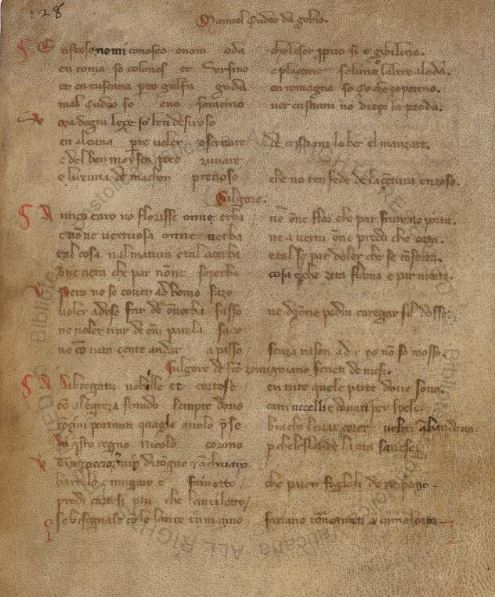


 Return to top
Return to top